四年级下册牛津英语复习汇总
最新牛津英语四年级下册知识点梳理
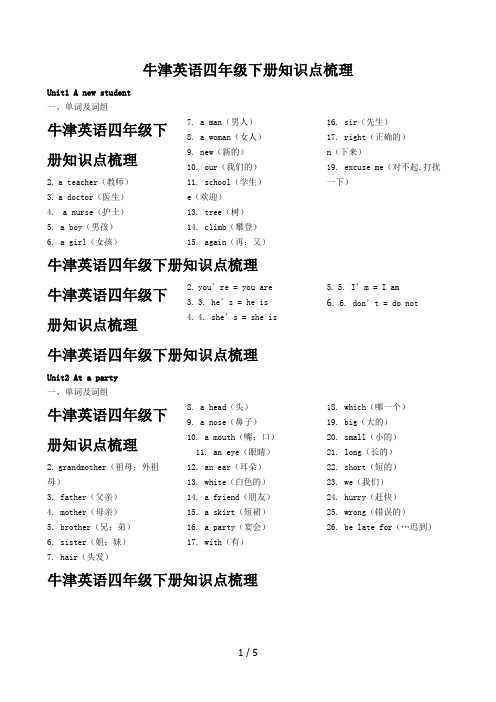
牛津英语四年级下册知识点梳理Unit1 A new student一、单词及词组牛津英语四年级下册知识点梳理2.a teacher(教师)3.a doctor(医生)4. a nurse(护士)5. a boy(男孩)6. a girl(女孩)7. a man(男人)8. a woman(女人)9. new(新的)10. our(我们的)11. school(学生)e(欢迎)13. tree(树)14. climb(攀登)15. again(再;又)16. sir(先生)17. right(正确的)n(下来)19. excuse me(对不起,打扰一下)牛津英语四年级下册知识点梳理牛津英语四年级下册知识点梳理2.you’re = you are3.3. he’s = he is4.4. she’s = she is5.5. I’m = I am6.6. don’t = do not牛津英语四年级下册知识点梳理Unit2 At a party一、单词及词组牛津英语四年级下册知识点梳理2.grandmother(祖母;外祖母)3. father(父亲)4. mother(母亲)5. brother(兄;弟)6. sister(姐;妹)7. hair(头发)8. a head(头)9. a nose(鼻子)10. a mouth(嘴;口)11. an eye(眼睛)12. an ear(耳朵)13. white(白色的)14. a friend(朋友)15. a skirt(短裙)16. a party(宴会)17. with(有)18. which(哪一个)19. big(大的)20. small(小的)21. long(长的)22. short(短的)23. we(我们)24. hurry(赶快)25. wrong(错误的)26. be late for(…迟到)牛津英语四年级下册知识点梳理Unit3 What’s your job?一、单词及词组1. a policeman (policemen)(警察)2. a policewoman (policewomen)(女警察)3. a waiter (waiters)(男服务员)4. a waitress (waitresses)(女服务员)5. a driver (drivers)(司机)6. a worker (workers)(工人)7. a cook (cooks)(厨师) 8. a farmer (farmers)(农民)9. job(职业) 10. name(名字) 11. their(他(她/它)们的) 12. today(今天)13. old(老的) 14. about(大约) 15. want(想要) 16. cold(冷的)17. how old(几岁) 18. how many(多少) 19. look at(看)二、缩写词1. aren’t = are not2. what’s = what is3. they’re = they are三、句型1. What’s your job?(你的职业是什么?)I’m a…(我是一位…)What’s his job?(他的职业是什么?)He’s a…(他是一位…)What’s her j ob?(她的职业是什么?)She’s a…(她是一位…)2. What are their jobs?(他/她们的职业是什么?)They’re…(他/她们是…)3. Are they…?(他/她们是…吗?) Yes, they are.(是,他/她们是的。
牛津英语四年级下册知识点精编WORD版
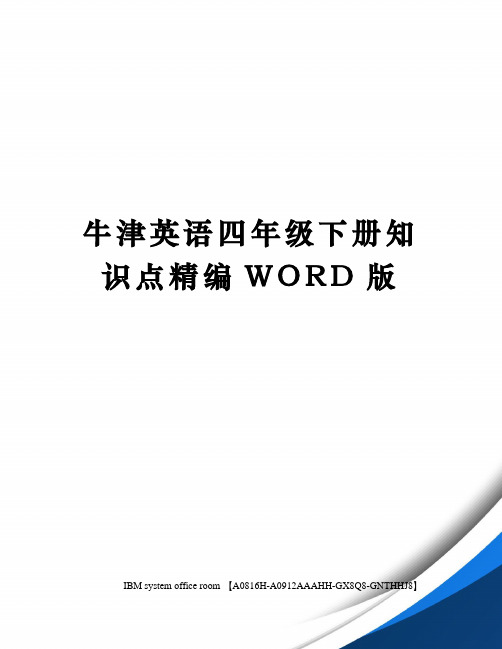
牛津英语四年级下册知识点精编W O R D版 IBM system office room 【A0816H-A0912AAAHH-GX8Q8-GNTHHJ8】M o d u l e1U s i n g m y f i v e s e n s e s Unit1 What can you smell and tastes?生词:watermelon grape plum cherry strawberry音标:-ar car park -ue blue school语法:What is it?Is it...?It’s...Unit2 How does it feel?生词:hard soft rough smooth sharp blunt thick thin音标:-ir- skirt -ur- purse -au- Laura -oor floor语法:Whose ... is this/that/ are these/those?It’s/They’re...Unit3 Look at the shadow生词:hill lawn path bench音标:-ee bee -ea tea -eer deer -ear tear语法:It + v.(does)...Module2 My favourite thingsUnit1 Sports生词:play football play table tennis play volleyball play badminton play basketball音标:-i- five -ie pie语法:Does...like...(doing)?Yes,...does. / No,...doesn’t.Unit2 Cute animals生词:bone cat food parrot fish dog food tortoise 音标:-oe Joe -oa- goat -o Flo语法:What does...(do)?...(does)...Eg: What animals do you like? I like cats.What food does a cat eat? It eats cat food.Unit3 Home life生词:bedroom living room bathroom kitchen音标:-oy toy -oi- noise语法:...am/is/are...(doing)Module3 Things around usUnit1 Sounds生词:quiet loud bell television音标:-are square -ear bear -air hair语法:Is/are...(doing)?Yes,...is/are. No,...isn’t/aren’t.Unit2 Time生词:seven o’clock a quarter past seven half past seven a quarter to eight get up brush my teeth wash my face have breakfast音标:-ou- mouse ow- owl语法:What are you doing?I’m...What time is it?It’s...Unit3 Days of the week生词:always usually often sometimes never 音标:-ay May -ai- wait语法:What do you usually do?Sb. Usually/often/always/sometimes/never ... Module4 More things to learnUnit1 A music class生词:piano violin triangle drum音标:Where’s...?It’s...Whose...is this?It’s...Unit2 Festivals in China生词:the Spring Festival the Dragon Boat Festival the Middle-autumn Festival the Double Ninth Festival语法:When is ...Festival?Is it hot/sunny/...at...Festival?What do you do in ...Festival?What special food do you eat at...? Unit3 Story time生词:duckling swan nest。
牛津英语小学四年级的下册的学习知识点梳理.docx
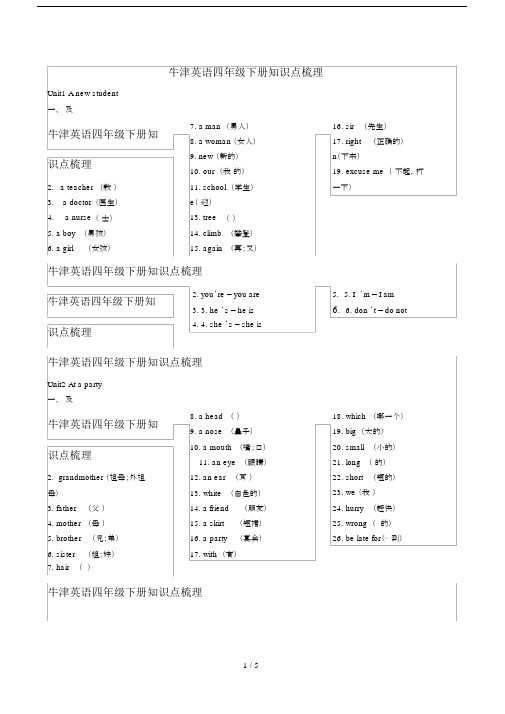
牛津英语四年级下册知识点梳理Unit1 A new student一、及牛津英语四年级下册知7. a man(男人)16. sir(先生)8. a woman (女人)17. right(正确的)识点梳理9. new (新的)n(下来)10. our (我的)19. excuse me (不起,打2. a teacher(教)11. school (学生)一下)3. a doctor(医生)e(迎)4. a nurse(士)13. tree()5. a boy(男孩)14. climb(攀登)6. a girl(女孩)15. again(再;又)牛津英语四年级下册知识点梳理牛津英语四年级下册知识点梳理2.you’re = you are 5. 5. I ’m = I am3.3. he ’s = he is 6. 6. don ’t = do not4.4. she ’s = she is牛津英语四年级下册知识点梳理Unit2 At a party一、及牛津英语四年级下册知8. a head()18. which(哪一个)9. a nose(鼻子)19. big (大的)识点梳理10. a mouth(嘴;口)20. small(小的)11. an eye(眼睛)21. long(的)2. grandmother (祖母;外祖12. an ear(耳)22. short(短的)母)13. white(白色的)23. we (我)3. father(父)14. a friend(朋友)24. hurry(赶快)4. mother(母)15. a skirt(短裙)25. wrong (的)5. brother(兄;弟)16. a party(宴会)26. be late for(⋯到)6. sister(姐;妹)17. with (有)7. hair()牛津英语四年级下册知识点梳理Unit3 What ’s your job?一、及1. a policeman (policemen)(警察)3. a waiter (waiters)(男服)5. a driver (drivers)(司机)7. a cook (cooks)(厨)9. job()10. name (名字)13. old(老的)14. about(大)的)17. how old(几)18. how many二、写2. a policewoman (policewomen)(女警察)4. a waitress (waitresses)(女服)6. a worker (workers)(工人)8. a farmer (farmers)(民)11. their(他(她/它)的)12. today(今天)15. want(想要)16. cold(冷(多少)19. look at(看)1. aren ’t = are not2. what ’s = what is3. they ’re = they are三、句型1.What ’s your job? (你的是什么?)I ’m a⋯(我是一位⋯)What’s his job? (他的是什么?)He’s a ⋯(他是一位⋯)What’s her j ob?(她的是什么?)She’s a ⋯(她是一位⋯)2.What are their jobs?(他 / 她的是什么?)They’re ⋯(他 / 她是⋯)3.Are they ⋯?(他 / 她是⋯?)Yes, they are.(是,他/她是的.)No, they aren ’t. They ’re ⋯(不,他/ 她不是的 . 他 / 她是⋯)4.How old are you?(你几了?)I ’m⋯(我⋯)How old is he?(他几了?)He’s⋯(他⋯) How old is she?(她几了?)She’s⋯(她⋯)5.What ’s your/his/her name?(你 / 他 / 她叫什么名字?)I ’m/He’s/She ’s ×× . (我/ 他 / 她是×× . )Unit4 Buying fruit一、及1. an apple (apples)(苹果)2. an orange (oranges)(桔子)3. a banana (bananas)(香蕉)4. a peach (peaches)(桃子)5. a grape (grapes)(葡萄)6. a pineapple (pineapples)(菠)7. a watermelon (watermelons)(西瓜)8. a pear (pears)(梨子)9. buy ()10. some(一些)11. fruit(水果)12. kilo (公斤)13. or (或者)14. yuan (元)15.great(好极了)二、写I ’d = I would三、句型1. What are these?(些是什么?) They’re ⋯(它是⋯)What are those?(那些是什么?)They’re ⋯(它是⋯)2. I ’d like some⋯, please.(我想要一些⋯)How many kilos?(多少公斤?)⋯kilo(s), please.(来⋯公斤. )Here are you.(你.)Unit6 Let’s go by taxi一、及1. a station(站)2. a supermarket(超市)3. a library()4. a theatre()5. a hospital(医院)6. an airport(机)7. by train(乘火)8. by plane(乘机)9. by minibus(乘中客)10. on foot(步行)11. by taxi(乘公共汽)12. how (怎么)13. there(在那里)14. for(往;向)15. free(空的)16. park(公园)17. play(玩;参加)18. football(足球)19. ball(球)20. Good idea.(好主意.)二、句型1. Let ’s go to the⋯(我一起去⋯)Good. (好的 . ) /Great.(太棒了.)How do we go there?(我怎么去那里啊?)Shall we go to(the)⋯(地点)by⋯(交通工具)? OK/All right.(好的)2. Is this⋯(交通工具)for⋯(地点)?(⋯是去⋯的?)Yes, it is.(是,它是的. )/No, it isn’t.(不,它不是的. )Unit7 At a snack bar一、及1. a pie (pies)()2. a hamburger (hamburgers)(堡包)3. a sweet (sweets)(糖果)4. a biscuit (biscuits)(干)5. noodles(面条)6. a bar of chocolate(一巧克力)7. a cup of tea(一杯茶)8. a cup of coffee(一杯咖啡)9. a glass of juice(一杯果汁)10. a carton of milk(一盒牛奶)11. a snack bar(快餐部)12. a basketball(球)13. move(移)14. dear (的)15. then(那么)16. an ice-cream(冰淇淋)17. a cake(蛋糕)18. water(水)19. hungry(的)19. thirsty(渴的)20. how much (多少())21. see the doctor(看医生)22. What would you like?(你要什么?)23. How about you?(你怎么?)24. Something to drink?(要喝些什么?)25. Anything else?(要的西?)二、句型1. What would you like?(你要什么?)I ’d like⋯ /A/Some ⋯, please. (我想要⋯ /来一个/ 一些⋯)2. How much is it?(它多少?)It’s⋯yuan. /⋯yuan, please.((它)⋯元. )How much are they?它多少?They’re ⋯yuan. / ⋯yuan, please.((它)⋯元. )Unit8 Open Day一、及1. a chair(椅子)2. a blackboard(黑板)3. a picture(画)r (算机) 5. a bookcase(橱) 6. a music room(音室)7. an office(公室)8. a playground(操)9. our(我的)10. classroom(教室)11. open day (接待日)12. bright(明亮的)13. TV ()14. sometimes(有)15. watch (看)16. piano(琴)17. near (靠近)18. window (窗)19. songbook (歌本)20. lots of = a lot of(多的)21. T-shirt( T 恤衫)22. smart(好看的)23. map(地)24. them(他 / 她/ 它)25. China(中国)26. box(盒子)27. table(桌子)28. read ()28. I ’ve got = I have got(我有)二、写there ’s = there is三、句型What’s on/in/near the ⋯?(⋯上面/ 里面 / 旁有什么?)There’s a⋯ on/in/near the⋯(有一个⋯在⋯上面/ 里面 / 旁 . )There are some⋯ on/in/near the⋯(有一些⋯在⋯上面/ 里面 / 旁 . )Unit9 Breakfast一、及1. a knife(刀)2. a fork(叉)3. a plate(子)4. a bowl(碗)5. a cup(杯子)6. a bottle(狭小口瓶)7. a spoon(匙)8. a glass(玻璃杯)9. a cupboard(碗橱)10. chopsticks (筷子)11. rice (米)12. bread (面包)13. an egg(蛋)14. a fridge(冰箱)15. breakfast(早)16. no (没有的)17. a carton of(一()盒)18. use(使用)19. try()e(来)21. dinner(正餐)22. What ’s for bre akfast? (早吃什么?)二、句型1.Where ’s the ⋯?(⋯在哪里?)It ’s on/in/near the ⋯(它在⋯上面 / 里面 / 旁 . )2.Where are my ⋯?(我的⋯在哪里?)They’re on/in/near the⋯(它在⋯上面/里面/旁.)3.There ’s no ⋯ on/in/near the⋯(⋯上面 / 里面 / 旁没有)。
复习资料(知识清单)牛津上海版(三起)英语四年级下册

四年级下册复习资料单词Unit1 touch feel soft hard thickthin hear man noise young blindUnit2 grape straw-berry watermelon juicesmell taste sweet sour or wait minuteget fox round purple thoseUnit3 noon evening night moon shadow high skyagain rise go down him stopunit4 subject lesson Chinese English PE Maths Science from break timetable a.m. p.m. Musicfrom... to...unit5 sport basketball football volleyballtell about club join us together table tennisUnit6 mu-sic guitar violin piano city bag all wonderfulUnit7 time o'clock quarter half start dinner catch washUnit8 Monday Tuesday Wednesday Thursday FridaySaturday Sunday week weekend game after clockUnit9 China Australia Sydney January February MarchAprilMay June July Au-gust September October NovemberDecember live talk wear e-mail computerUnit10 gar-den plant leaf water grow all Seed them Unit11 cinema museum zoo Canada India Thailandsong alsoUnit12 duckling swan duck river ugly baby later back behind away quack into短语at noon/ night go down take a walk from...to... play football/basketball/volleyball play the violin/guitar/pianowash...face brush...teeth get up half past...go to school/bed have breakfast/lunch/dinner play chessat the weekend (be) late for have a party look into swim away well done wait a minute look at句型结构1.对某物进行确认:Is it a/an+可数名词单数?-- Yes, it is. / No, it isn't. Are they/these/those+可数名词复数?---Yes, they are./ No, they aren't.2.选择疑问句:Is it+选项A+or+选项B?---It is s+选项A/选项BAre they+ 选项A+ or+ 选项B ? .-They are+ 选项A/选项B (选项如是名复名词要用复数形式。
牛津译林版英语四年级下册全册复习资料

牛津译林版英语四年级下册全册复习资料Unit 3 My Day Grammar Points1.ns of time: in。
on。
atIn:Used for seasons。
e.g。
in springUsed for ds of time。
e.g。
in the morning。
in the afternoon。
in the eveningOn:Used for days。
e.g。
on MondayAt:Used for specific times。
e.g。
at 3 o'clockUnit 1 Our School Subjects Grammar Points1.Asking about school subjects:Use "what" to ask about a subject。
e.g。
What do you like?Use "what" to ask about a specific class。
e.g。
What do you have this term?Use "what" to ask about subjects in general。
e.g。
What do you have?2.Capitalize the first letter of subject names。
e.g。
Science。
Chinesee "It's" to express that a subject is interestinge "morning" for today's morning。
and "in the morning" for any other morninge "in front of" to describe the n of the playground。
四年级下册牛津英语复习汇总
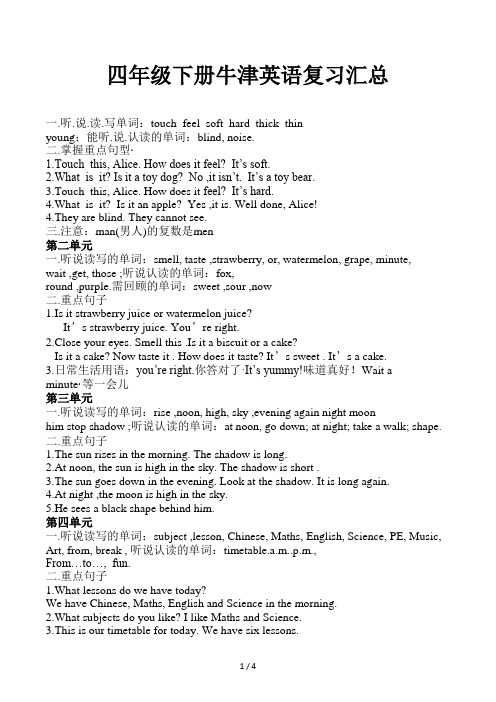
四年级下册牛津英语复习汇总一.听.说.读.写单词:touch feel soft hard thick thinyoung;能听.说.认读的单词:blind, noise.二.掌握重点句型·1.Touch this, Alice. How does it feel? It’s soft.2.What is it? Is it a toy dog? No ,it isn’t. It’s a toy bear.3.Touch this, Alice. How does it feel? It’s hard.4.What is it? Is it an apple? Yes ,it is. Well done, Alice!4.They are blind. They cannot see.三.注意:man(男人)的复数是men第二单元一.听说读写的单词:smell, taste ,strawberry, or, watermelon, grape, minute,wait ,get, those ;听说认读的单词:fox,round ,purple.需回顾的单词:sweet ,sour ,now二.重点句子1.Is it strawberry juice or watermelon juice?It’s strawberry juice. You’re right.2.Close your eyes. Smell this .Is it a biscuit or a cake?Is it a cake? Now taste it . How does it taste? It’s sweet . It’s a cake.3.日常生活用语:you’re right.你答对了·It’s yummy!味道真好!Wait a minute·等一会儿第三单元一.听说读写的单词:rise ,noon, high, sky ,evening again night moonhim stop shadow ;听说认读的单词:at noon, go down; at night; take a walk; shape.二.重点句子1.The sun rises in the morning. The shadow is long.2.At noon, the sun is high in the sky. The shadow is short .3.The sun goes down in the evening. Look at the shadow. It is long again.4.At night ,the moon is high in the sky.5.He sees a black shape behind him.第四单元一.听说读写的单词:subject ,lesson, Chinese, Maths, English, Science, PE, Music, Art, from, break , 听说认读的单词:timetable.a.m..p.m.,From…to…, fun.二.重点句子1.What lessons do we have today?We have Chinese, Maths, English and Science in the morning.2.What subjects do you like? I like Maths and Science.3.This is our timetable for today. We have six lessons.4.From 11:20 a.m. to 1 p.m. , we have a lunch break.5.Art is fun.第五单元一.听说读写的单词:sport, football, join, tell, about, basketball, volleyball, us;听说认读的单词club, meet, want ,sure, table tennis, play football, play basketball, play volleyball.二.重点句子·1.I like playing football.2.Does Alice like playing football? Yes, she does.(No, she doesn’t)3.There’s a new football club in our school.4.Let’s tell Alice about the football club.5.Peter and I want to join the football club. Sure .6.What does she like doing? She likes playing table tennis.What do you like doing? I like playing volleyball.第六单元一., a bag of gold, play the guitar, play the violin.二.重点句子:1. whose guitar is it? It’s Joe’s guitar.2.Can you p lay the violin? No, I can’t.3.What can you play? I can play the guitar.4.There are many mice in the city. T5.I can help you .Give me a bag of gold.6.All the mice walk behind him. All the children walk behind him.第七单元一.听说读写的单词:o’clock, quarter, time, half, wash, dinner, start,听说认读的单词:catch.start ,work, get up, brush my teeth, half past, havebreakfast, go to school, wash my face, have lunch, have dinner, go to bed.二.重点句子1.What time is it? It’s half past seven.2.What time do you get up? I get up at seven o’clock .What time does Kitty go to school? She goes to school at half past six.3.Kitty brushes her teeth at a quarter past seven.4.Kitty goes to school at a quarter to eight.5.At eight o’clock ,they start to work .They catch a lot of mice.6.Min and Mog go to bed at six o’clock in the morning.第八单元一.听说读写的单词:Monday , Tuesday, Wednesday, Thursday, Friday, Saturday, Sunday, with ,game, clock, 听说认读的单词:week.weekend, play chess, play games, at the weekend, (be)late for.after school.二.重点句子1.Peter likes reading. He goes to the school library on Monday afternoon.2.At the weekend ,Peter goes to the park with his family.3.Tom runs out . He doesn’t have breakfast.4.Tom is not late for school.5.Tom likes reading in the evening.第九单元一.听说读写的单词;weather, January, February , March, April, May, June, July, August, September, October, November, December.hat.二.重点句子:1.I live in China. She lives in Sydney, Australia.Sunday.3.How’s the weather in December? It’s sunny and hot.4.Today is Christmas. It’s sunny a nd hot here.5.Here is a photo of my family.6.I go to the beach with family on Christmas Day every year.7.Look at him. He wears shorts in Australia.8.Please write and tell me about your New Year.第十单元一.听说读写的单词:garden, plant, leaf(leaves复数).them, grow,flower;听说认读的单词:water, seed, every day, brown二.重点句子:1.I have a garden. The plant has some big leaves.2.There are many plants in my garden.3.I water them every day. The plants grow and grow.4.They are all beautiful.I like reading and listening to music in my garden.5.It rain. We drink the rain water.6.Look at us! There are two leaves on our heads.7.Now we have yellow flowers.第十一单元一.听说读写的单词:Children’s Day, song, zoo, cinema, museum,also,听说认读的单词:have a party, ride a bike, go to the cinema, fly kites.二.重点句子:1.Hw are you? I’m fine. Thank you.(Fine, thanks.)2.It is Children’s Day. Our classroom looks beautiful.3.In the morning, we have a party.4.In the afternoon, I go to the zoo with my parents.5.On Children’s Day, I can ride a bike with my b rother.6.Do you go to the park on Children’s Day? Yes, I do.(No, I don’t)第十二单元一.听说读写的单词:ugly, duck, river, baby, back, into;听说认读的单词:duckling, later, quack, away, swan, open.二.重点句子:1.It is sunny and warm. Mother Duck is near the river.2.Mother Duck sits on the eggs.3 .The big egg opens later. The duckling is big and grey.4.The three yellow ducklings sit on her back.The ugly duckling swims behind them.5.The ugly duckling is sad. He swims away.6.The ugly duckling has no home.7.It is spring again. The ugly duckling is in the grass.8.The ugly duckling looks into the water .9.I’m an ugly duckling. I’m a beautiful swan.特殊的复数形式:baby—babies man—men child--childrenleaf—leaves sheep—sheep tooth—teethmouse—mice当主语为第三人称单数式.动词要发生变化:1.read—reads get—gets2.wash—washes brush—brushes go—goes3.fly—flies不规则单词的三单形式:have—has do—does。
沪教牛津英语四年级下册 Module 4 知识点归纳总结复习教案
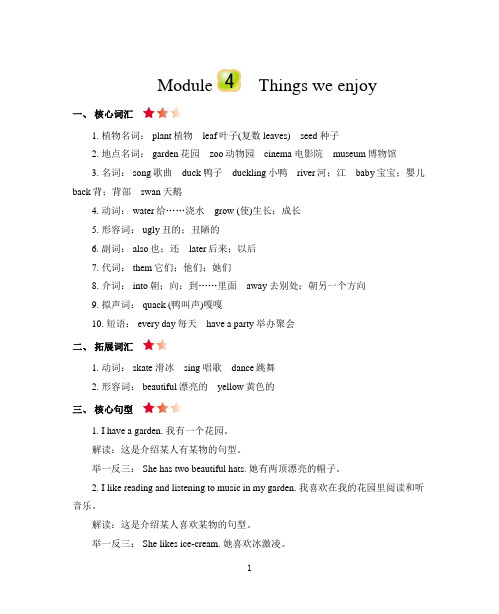
2. 地点名词: garden花园zoo动物园cinema 电影院museum博物馆3. 名词: song歌曲duck 鸭子duckling小鸭river河;江baby宝宝;婴儿back背;背部swan天鹅4. 动词: water给……浇水grow (使)生长;成长5. 形容词: ugly丑的;丑陋的6. 副词: also也;还later后来;以后7. 代词: them它们;他们;她们8. 介词: into朝;向;到……里面away 去别处;朝另一个方向9. 拟声词: quack (鸭叫声)嘎嘎10. 短语: every day每天have a party 举办聚会二、拓展词汇1. 动词: skate 滑冰sing 唱歌dance跳舞2. 形容词: beautiful漂亮的yellow黄色的三、核心句型1. I have a garden. 我有一个花园。
解读:这是介绍某人有某物的句型。
举一反三: She has two beautiful hats. 她有两顶漂亮的帽子。
2. I like reading and listening to music in my garden. 我喜欢在我的花园里阅读和听音乐。
解读:这是介绍某人喜欢某物的句型。
举一反三: She likes ice-cream. 她喜欢冰激凌。
解读:这是询问某人在某天是否做某事的句型。
举一反三: Does your brother sing on Children’s Day? 儿童节那天你弟弟会唱歌吗?5. In China, Children’s Day is in June. 在中国,儿童节在六月。
解读:这是介绍节日具体日期的句型。
举一反三: The Labour Day is in May. 劳动节在五月。
6. The ugly duckling is in the grass. 丑小鸭在草地上。
解读:这是描写某人或某物所处方位的句型。
四年级下册英语期末复习知识梳理牛津上海版(三起)
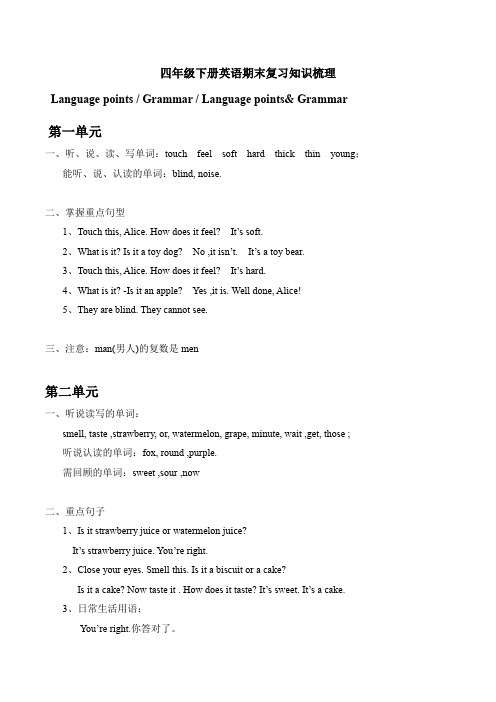
四年级下册英语期末复习知识梳理Language points / Grammar / Language points& Grammar 第一单元一、听、说、读、写单词:touch feel soft hard thick thin young;能听、说、认读的单词:blind, noise.二、掌握重点句型1、Touch this, Alice. How does it feel? It’s soft.2、What is it? Is it a toy dog? No ,it isn’t. It’s a toy bear.3、Touch this, Alice. How does it feel? It’s hard.4、What is it? -Is it an apple? Yes ,it is. Well done, Alice!5、They are blind. They cannot see.三、注意:man(男人)的复数是men第二单元一、听说读写的单词:smell, taste ,strawberry, or, watermelon, grape, minute, wait ,get, those ;听说认读的单词:fox, round ,purple.需回顾的单词:sweet ,sour ,now二、重点句子1、Is it strawberry juice or watermelon juice?It’s strawberry juice. You’re right.2、Close your eyes. Smell this. Is it a biscuit or a cake?Is it a cake? Now taste it . How does it taste? It’s sweet. It’s a cake.3、日常生活用语:You’re right.你答对了。
四年级下册牛津英语6-9单元短语复习总汇
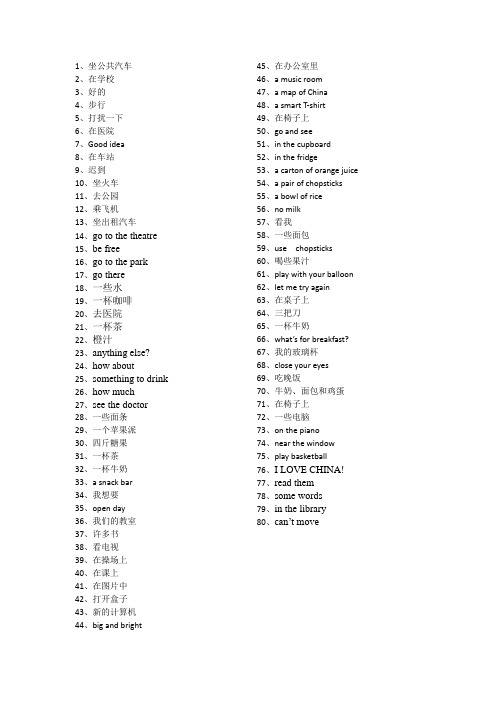
1、坐公共汽车2、在学校3、好的4、步行5、打扰一下6、在医院7、Good idea8、在车站9、迟到10、坐火车11、去公园12、乘飞机13、坐出租汽车14、go to the theatre15、be free16、go to the park17、go there18、一些水19、一杯咖啡20、去医院21、一杯茶22、橙汁23、anything else?24、how about25、something to drink26、how much27、see the doctor28、一些面条29、一个苹果派30、四斤糖果31、一杯茶32、一杯牛奶33、a snack bar34、我想要35、open day36、我们的教室37、许多书38、看电视39、在操场上40、在课上41、在图片中42、打开盒子43、新的计算机44、big and bright 45、在办公室里46、a music room47、a map of China48、a smart T-shirt49、在椅子上50、go and see51、in the cupboard52、in the fridge53、a carton of orange juice54、a pair of chopsticks55、a bowl of rice56、no milk57、看我58、一些面包59、use chopsticks60、喝些果汁61、play with your balloon62、let me try again63、在桌子上64、三把刀65、一杯牛奶66、what’s for breakfast?67、我的玻璃杯68、close your eyes69、吃晚饭70、牛奶、面包和鸡蛋71、在椅子上72、一些电脑73、on the piano74、near the window75、play basketball76、I LOVE CHINA!77、read them78、some words79、in the library80、can’t move。
牛津版英语四年级下册知识点总结

牛津版英语四年级下册知识点总结以下是牛津版英语四年级下册的知识点总结:Unit 1: Hobbies and Interests- Vocabulary: play, swim, jump, run, dance, skate- Grammar: Present Simple tense (Affirmative, Negative, Interrogative)- Sentence Patterns: I play football. Do you play football? He doesn't play football.Unit 2: At the Zoo- Vocabulary: zoo, keep, feed, see, animal names (e.g. lion, tiger, giraffe)- Grammar: Plural nouns- Sentence Patterns: We see animals. They don't see animals. Unit 3: My Body- Vocabulary: head, eyes, ears, nose, mouth, neck, shoulder, arm, hand, leg, foot- Grammar: Possessive adjectives (my, your, his, her)- Sentence Patterns: My head hurts. His shoulder doesn't hurt. Unit 4: The Weather- Vocabulary: sunny, windy, rainy, cloudy, snowy- Grammar: Present Continuous tense (Affirmative)- Sentence Patterns: It's sunny. It's not rainy.Unit 5: Food and Drink- Vocabulary: apple, banana, orange, cake, hamburgers, sandwiches, milk, juice- Grammar: Countable and Uncountable nouns- Sentence Patterns: I eat an apple. He drinks milk.Unit 6: Our Homes- Vocabulary: living room, bedroom, kitchen, bathroom, garden, house, apartment- Grammar: Possessive pronouns (mine, yours, his, hers)- Sentence Patterns: This is my house. That is her apartment. The garden is ours.Unit 7: In the City- Vocabulary: hospital, supermarket, park, cinema, museum, post office- Grammar: Prepositions of place (in, on, at)- Sentence Patterns: The hospital is in the city. The park is next to the supermarket.Unit 8: Transportation- Vocabulary: bus, train, car, plane, bicycle, boat, helicopter- Grammar: There is/are- Sentence Patterns: There is a bus. There are boats.Unit 9: People and Jobs- Vocabulary: doctor, teacher, firefighter, police officer, chef, musician- Grammar: Present Continuous tense (Negative, Interrogative) - Sentence Patterns: He isn't cooking. Are you playing the piano? Unit 10: Celebrations- Vocabulary: birthday, Christmas, New Year, Halloween,Thanksgiving, Easter- Grammar: Past Simple tense (regular verbs)- Sentence Patterns: I celebrated my birthday. We didn't celebrate Halloween.这些是牛津版英语四年级下册的主要知识点总结,希望对你有所帮助!。
牛津版四年级下册英语知识点总结归纳-最新
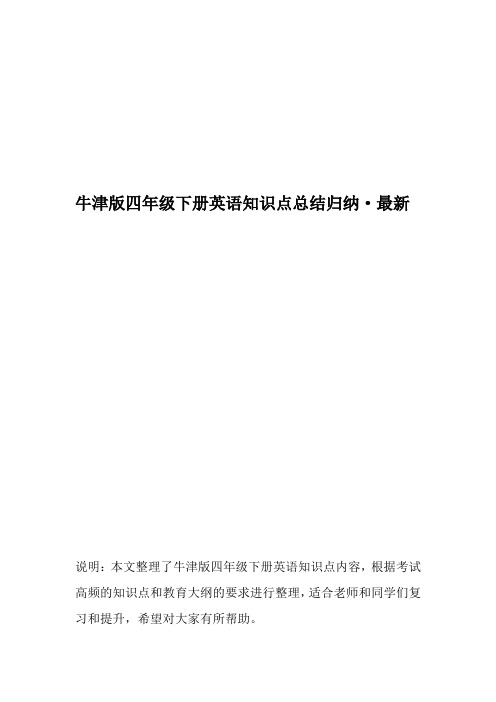
牛津版四年级下册英语知识点总结归纳·最新说明:本文整理了牛津版四年级下册英语知识点内容,根据考试高频的知识点和教育大纲的要求进行整理,适合老师和同学们复习和提升,希望对大家有所帮助。
目录Unit 1 Our school subjects (4)1、语音 (4)2、单词 (4)3、词组 (4)4、句型 (4)5、语法 (5)6、拓展 (5)Unit 2 After school (6)1、语音 (6)2、单词 (6)3、词组 (6)4、句型 (6)5、语法 (6)6、拓展 (7)Unit 3 My day (8)1、语音 (8)2、单词 (8)3、词组 (8)4、句型 (8)5、语法 (8)6、拓展 (8)Unit 4 Drawing in the park (10)1、语音 (10)2、单词 (10)3、词组 (10)4、句型 (10)5、语法 (11)6、拓展 (11)Unit 5 Seasons (12)1、语音 (12)2、单词 (12)3、词组 (12)4、句型 (12)5、语法 (12)6、拓展 (12)Unit 6 Whose dress is this? (14)1、语音 (14)2、单词 (14)3、词组 (14)4、句型 (14)5、语法 (14)6、拓展 (15)Unit 7 What’s the matter? (16)1、语音 (16)2、单词 (16)3、词组 (16)4、句型 (16)5、语法 (16)6、拓展 (16)Unit 8 How are you? (18)1、语音 (18)2、单词 (18)3、词组 (18)4、句型 (18)5、语法 (18)6、拓展 (19)Unit 1 Our school subjects1、语音字母a的读音/ eI / cake grape make skate2、单词1、school 学校 2. subject 课程 3. see 看见 4. Chinese 语文5. Maths 数学6. Music 音乐7. Art 美术8. lesson 课9. Monday 星期一 10.timetable 课程表 11. PE 体育12. Science 科学13. fun 乐趣,快乐 14. afternoon 下午 15. playground 操场3、词组1. our school subjects 我们的学校课程2. what subjects 什么课程3. like Chinese and Maths 喜欢语文和数学4. on Monday 在周一5. have an Art lesson 上一节美术课6. what about you 你呢7. go to the playground 去操场8. this afternoon 今天下午9. this morning 今天上午10. make a cake 做一个蛋糕11. what lessons 什么课12. go to 去13. our new timetable 我们的新课程表4、句型1. Welcome back to school. 欢迎回到学校。
四年级下册牛津英语复习汇总

第一单元一、听、说、读、写单词:;能听、说、认读的单词:, .二、掌握重点句型。
1、 , . ? ’s .2、 ? a ? ’t. ’s a .3、 , . ? ’s .4、 ? ? . , Alice!4、 . .三、注意:(男人)的复数是第二单元一、听说读写的单词:, , , , , , , ;听说认读的单词:, .需回忆的单词:二、重点句子1、 ?’s . ’ .2、 . a a ?a ? . ? ’s . ’s a .3、日常生活用语:’ .你答对了。
’s !味道真好! a 。
等一会儿第三单元一、听说读写的单词: , ,;听说认读的单词: , ; ; a ; .二、重点句子1、 . .2、 , . .3、 . . .4、 .5、 a .第四单元一、听说读写的单词: , , , , , , , , , , 听说认读的单词:,.,.,……, .二、重点句子1、 ?, , .2、 ? I .3、 . .4、 1120 a. 1 . , a .5、 .第五单元一、听说读写的单词:, , , , , , , ; 听说认读的单词, , , , , , .二、重点句子。
1、I .2、 ? , .(, ’t)3、’s a .4、’s .5、 I . ? .6、 ? .? I .第六单元一、听说读写的单词:, , , , , , , ; 听说认读的单词:〔复数〕,,, (复数), , a , , , 〔回家〕.二、重点句子:1、 ? ’s ’s .2、 ? , I ’t.3、 ? I .4、 . .5、I a .6、 . .第七单元一、听说读写的单词:o’, , , , , , , 听说认读的单词:, , , , , , , , , , .二、重点句子1、 ? ’s .2、 ? I o’ .? .3、 a .4、 a .5、 o’ a .6、 o’ .第八单元一、听说读写的单词: , , , , , , , , , 听说认读的单词:,, , , , 〔〕, .二、重点句子1、 . .2、 .3、 . ’t .4、 .5、 .第九单元一、听说读写的单词, , , , , , , , , , , , , , , ,听说认读的单词:,, , (愉快的),, , , , , ,.二、重点句子:1、I . Sydney, Australia.2、 .3、’s ? ’s .4、 . ’s .5、 a .6、I .7、 . Australia.8、 .第十单元一、听说读写的单词:, , (复数),, , ;听说认读的单词:, , ,二、重点句子:1、I a . .2、 .a .3、I . .4、 .I .5、 . .6、 ! .7、 .第十一单元一、听说读写的单词:’s , , , , ,听说认读的单词: a , a , , .二、重点句子:1、 ? I’m . .(, .)2、’s . .3、 , a .4、 , I .5、’s , I a .6、’s ? , I .(, I ’t)第十二单元一、听说读写的单词:, , , , , ;听说认读的单词:, , , , , .二、重点句子:1、 . .2、 .3 、 . .4、 ..5、 . .6、 .7、 . .8、 .9、I’m . I’m a .特殊的复数形式:——————当主语为第三人称单数式,动词要发生变化:1、——2、———3、—不规那么单词的三单形式:——。
牛津译林版四年级下册英语全册复习资料集
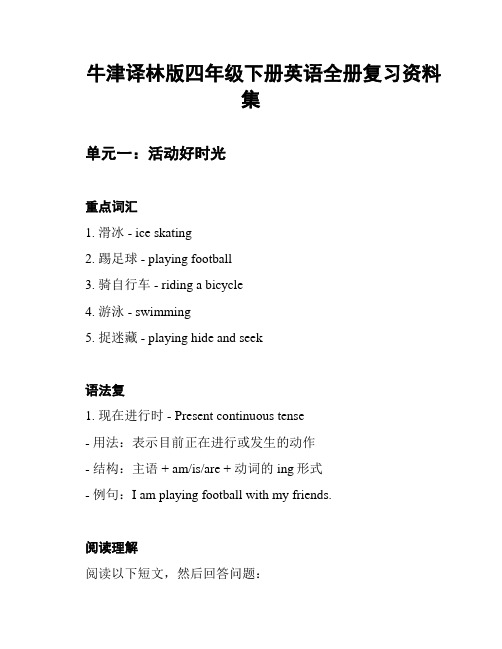
牛津译林版四年级下册英语全册复习资料集单元一:活动好时光重点词汇1. 滑冰 - ice skating2. 踢足球 - playing football3. 骑自行车 - riding a bicycle4. 游泳 - swimming5. 捉迷藏 - playing hide and seek语法复1. 现在进行时 - Present continuous tense- 用法:表示目前正在进行或发生的动作- 结构:主语 + am/is/are + 动词的ing形式- 例句:I am playing football with my friends.阅读理解阅读以下短文,然后回答问题:Tom and his family went ice skating last weekend. They had a great time on the ice. Tom's sister, Lucy, was skating very fast. Tom's dad was skating with Lucy. Tom's mom watched them and took some pictures. Tom was not good at ice skating, but he tried his best. He fell down a few times, but he didn't give up. In the end, he could skate a little bit. It was a fun day for the whole family.1. Where did Tom and his family go last weekend?2. Who was skating very fast?3. What did Tom's mom do?4. Was Tom good at ice skating?5. Did Tom give up when he fell down?单元二:田园农场重点词汇1. 农场 - farm2. 农民 - farmer3. 种蔬菜 - grow vegetables4. 收获 - harvest5. 动物 - animals语法复1. 一般现在时 - Simple present tense- 用法:表示客观事实或惯性动作- 结构:主语 + 动词原形- 例句:Farmers grow vegetables on the farm.阅读理解阅读以下短文,然后回答问题:Mr. Green is a farmer. He lives on a farm. Every day, he gets up early and goes to the farm. He grows vegetables and fruits. He takes care of the animals too. In the harvest season, he gathers all the crops. Mr. Green enjoys working on the farm. He loves nature and animals.1. What does Mr. Green do?2. Where does Mr. Green live?3. What does Mr. Green grow on the farm?4. What does Mr. Green do during the harvest season?5. Why does Mr. Green enjoy working on the farm? 单元三:城市生活重点词汇1. 城市 - city2. 大楼 - building3. 车站 - station4. 商店 - shop5. 公园 - park语法复1. 介词in, on, under - in, on, under- 用法:表示位置关系- 例句:There is a park in the city.阅读理解阅读以下短文,然后回答问题:Lisa lives in a city. There are tall buildings, shops, and a train station in the city. She goes to school by bus every day. After school, she likes to play in the park. Sometimes, she meets her friends there. Lisa enjoys the city life.1. Where does Lisa live?2. What can you find in the city?3. How does Lisa go to school?4. What does Lisa like to do after school?5. Does Lisa enjoy the city life or countryside life?单元四:生日派对重点词汇1. 生日 - birthday2. 蛋糕 - cake3. 气球 - balloon4. 礼物 - gift5. 唱歌 - sing语法复1. 祈使句 - Imperative sentence- 用法:表达命令、请求或建议- 例句:Sing a birthday song for your friend.阅读理解阅读以下短文,然后回答问题:1. Whose birthday is it today?2. What is at Lucy's birthday party?3. What will Lucy's friends do for her?4. How does Lucy feel on her birthday?5. Is Lucy unhappy on her special day?以上是《牛津译林版四年级下册英语全册复习资料集》的一部分,希望对你的复习有所帮助。
4年级英语下册牛津版核心语法知识点

四年级英语下册牛津版核心语法知识点一、名词在四年级英语下册牛津版中,名词是一个非常重要的语法知识点。
名词是用来表示人、事物、地点或抽象概念的词语。
在学习英语的过程中,名词的单数和复数形式、所有格以及不可数名词的用法都是需要重点掌握的内容。
1. 单数和复数形式在英语中,名词的单数形式和复数形式有着不同的变化规律。
有些名词在后面添加-s构成复数,有些名词要变换其拼写形式,有些名词则是不变的。
cat的复数形式是cats,而child的复数形式是children,而名词sheep的复数形式和单数形式相同。
2. 名词所有格名词的所有格表示所属关系。
在英语中,名词所有格的构成形式有所不同,主要分为添加-apostrophe和-s、只添加-apostrophe以及以-s结尾的名词直接添加-apostrophe等形式。
Tom的书可以表示为Tom's book,而复数名词的所有格形式为添加-apostrophe和-s,例如children的书可以表示为children's book。
3. 不可数名词的用法在四年级英语下册牛津版中,还介绍了不可数名词的用法。
不可数名词表示一类事物的总称,无复数形式,通常用来表示物质、液体、抽象概念等。
water、milk、rice等都属于不可数名词。
在句子中,不可数名词通常用来表示某种状态、特征、性质等。
二、动词动词是句子中最重要的成分,它可以表示行为、状态或动作的发生。
在四年级英语下册牛津版中,动词的时态、语态以及不同形式的用法是需要重点关注的语法知识点。
1. 动词的时态在英语中,动词的时态有着严谨的变化规律,分为一般现在时、一般过去时、一般将来时等。
学生需要掌握不同时态的构成形式和用法,以便能够准确地表达所要表达的时态含义。
2. 动词的语态动词的语态分为主动语态和被动语态。
主动语态表示主语是动作的执行者,而被动语态则表示主语是动作的承受者。
在四年级英语下册牛津版中,学生需要了解被动语态的构成和用法,并能够准确地进行句子转换。
牛津英语四年级下册知识点整理

Module1 Using my five sensesUnit1 What can you smell and tastes?生词:watermelon grape plum cherry strawberry音标:-ar car park -ue blue school语法:What is it?Is it...?It’s...Unit2 How does it feel?生词:hard soft rough smooth sharp blunt thick thin 音标:-ir- skirt -ur- purse -au- Laura -oor floor语法:Whose ... is this/that/ are these/those?It’s/They’re...Unit3 Look at the shadow生词:hill lawn path bench音标:-ee bee -ea tea -eer deer -ear tear语法:It + v.(does)...Module2 My favourite thingsUnit1 Sports生词:play football play table tennis play volleyball play badminton play basketball 音标:-i- five -ie pie语法:Does...like...(doing)?Yes,...does. / No,...doesn’t.Unit2 Cute animals生词:bone cat food parrot fish dog food tortoise 音标:-oe Joe -oa- goat -o Flo语法:What does...(do)?...(does)...Eg: What animals do you like? I like cats.What food does a cat eat? It eats cat food.Unit3 Home life生词:bedroom living room bathroom kitchen 音标:-oy toy -oi- noise语法:...am/is/are...(doing)Module3 Things around usUnit1 Sounds生词:quiet loud bell television音标:-are square -ear bear -air hair语法:Is/are...(doing)?Yes,...is/are. No,...isn’t/aren’t.Unit2 Time生词:seven o’clock a quarter past seven half past seven a quarter to eight get up brush my teeth wash my face have breakfast音标:-ou- mouse ow- owl语法:What are you doing?I’m...What time is it?It’s...Unit3 Days of the week生词:always usually often sometimes never音标:-ay May -ai- wait语法:What do you usually do?Sb. Usually/often/always/sometimes/never ...Module4 More things to learnUnit1 A music class生词:piano violin triangle drum音标:Where’s...?It’s...Whose...is this?It’s...Unit2 Festivals in China生词:the Spring Festival the Dragon Boat Festival the Middle-autumn Festival the Double Ninth Festival语法:When is ...Festival?Is it hot/sunny/...at...Festival? What do you do in ...Festival? What special food do you eat at...?Unit3 Story time生词:duckling swan nest。
牛津英语四年级下册英语知识点
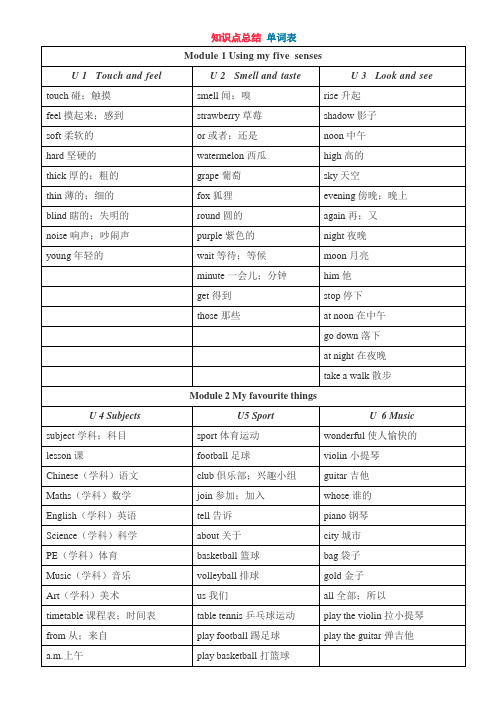
知识点总结单词表语法复习1.量词的用法There is a glass of watermelonjuice.There are three glass es of strawberry juice.2.选择疑问句和一般疑问句的区别(1)一般疑问句Is thekite red and blue?(这风筝是蓝红色的吗?)一般疑问句的回答必须Yes 或No 开头Yes, it is./No, it isn’t. (2)选择疑问句Is thekite red or blue?(这风筝是蓝色还是红色?)选择疑问句的回答必须是二选一:It’s red.或It’s blue.3.关于like 后面接不同的名词和动词like apples / like green ones (可数名词复数)like the apple / like the green one (可数名词单数)like jelly (不可数名词)like dancing=like to dance (动词)would like to dance (would like to do=want to do)be like me/her/his father…(解释为像,作介词)4.感叹句What nice grapes!(复数)What a nice girl!(单数)5.whose 对所有格提问Whose bag is this?-----It’s peter’s. (this/that 回答用it’s)Whose knives are those?-----They are his knives. (these/those 回答用they’re)6.s o 和too 解释为如此、太时后面跟形容词It’s so thick. /He is so puzzled.It’s too noisy.7.How+助动词+主语+动词The pineapple is rough. (划线提问)Howdoes the pineapple feel?This cherry is sweet. (划线提问)How does this cherry taste?8.祈使句和can 句型永远用动词原形,即使有now,也不能是进行时祈使句Let’s make a card now.Kitty, don’t put your book on the floor.(否定句在动词前加don’t)can 句型Can Lucy read the book now?(容易犯的错误:看见Lucy 一个人就用三单reads,或看见now 用进行时)9.There be 就近原则,后面所接词必须看清是否是可数名词从而确定be 动词There is a cat and two dogs. (离得近的是单数)There are two dogs and a cat. (离得近的是复数)There is some paper. (不可数)There are some paper rabbits. (前面有修饰的名词复数)There are some sheep. (单复数相同)There is some string. (不可数)There is a lot of apple juice. (前面有修饰的不可数)10.both 和all 放在be 动词之后,do 动词之前We are both tall. (be 动词之后)They are all blind. (be 动词之后)We both run fast. (do 动词之前)The brothers all touch the elephant. (do 动词之前)11.one of the 复数,谓语三单One of the boy s is Tom.say s one of the brother s12.一般时和进行时的区别进行时:当句子里有标志性的词如now,look,listen,it’s…几点(祈使句和can 句型除外),或是某个有上下情景的句子表示这个动作现在正在发生,结构be+doingListen, birds are singing.Where’s Sam? He is playing football outside.一般时:当句子里有标志性的词如every morning, on Moday,at weedends,always,usually, often,sometimes,never, at…几点等,表示陈述某个事实。
牛津译林版四年级英语下册 (全册)单元知识

四下Unit 1 Our school subjects 单元知识点四会单词1. school学校2. subject课程3. see看见,看到4. Chinese语文(课)5. Maths 数学(课)6. Art 美术(课)7. Music音乐(课)8. lesson课9. Monday星期一三会单词1. Welcome back to…欢迎回到…2. timetable课程表,时间表3. PE体育(课)4. Science 科学(课)5. fun乐趣,快乐6. go to 去……7. playground 操场8. afternoon 下午四会词组1. our school subjects 我们的学校课程2. see you 见到你3. Chinese and Maths 语文和数学4. what subjects 什么课程5. like English 喜欢英语6. time for PE 该上体育课的时间7. Art and Music 美术和音乐8. what lessons 什么课9. have Music and Maths 有英语课和数学课10. my school subjects 我的学校课程三会词组1. back to school 回到学校2. our new timetable 我们的新课程表3. Music and Science 音乐和科学4. go to the playground 去操场5. this morning 今天早上6. this afternoon 今天下午7. on Monday 在星期一8. like PE 喜欢体育课9. don’t like that 不喜欢那个10. don’t skate 不要滑冰11. make a cake 做一个蛋糕12. at school 在学校四会三会句型1. Welcome back to school, class. 欢迎回到学校,同学们。
牛津英语四年级下册知识点总结0822
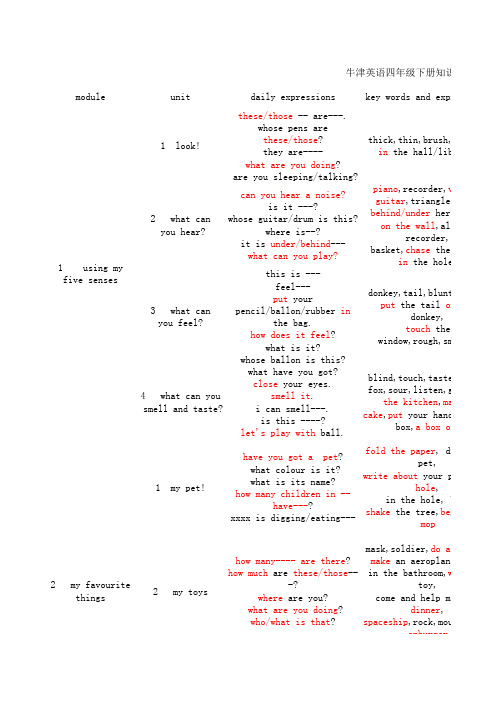
ldier,do a puzzle, n aeroplane/doll, bathroom,wash the
toy, and help me,cook
dinner, p,rock,mountain,mo onburger
数词的拼写和读法:21-50 特殊疑问句:how many ---
are there? how much are---?where are
these?
on the desk.
doing?
where is ---?
put the tail on the
i am reading.
recorder,violin,
情态动词:can
donkey.
let's go out.
r,triangle,drum,
wh-疑问句:whose ---is 选择:1 don't _____ the
dinner,
who/what is that?
spaceship,rock,mountain,mo
onburger
3 a busy family
what is xxxx doing? this is ---.
his/her name is---. she/he is --she/he can---what can---do?
you're late. i am late. listen to the wind/the
rain. where is my clock.
get up,under your bed, i am late,listen to,thunder, crack,wave,
what is the weather like january,february,march,
- 1、下载文档前请自行甄别文档内容的完整性,平台不提供额外的编辑、内容补充、找答案等附加服务。
- 2、"仅部分预览"的文档,不可在线预览部分如存在完整性等问题,可反馈申请退款(可完整预览的文档不适用该条件!)。
- 3、如文档侵犯您的权益,请联系客服反馈,我们会尽快为您处理(人工客服工作时间:9:00-18:30)。
四年级下册牛津英语复习汇总一.听.说.读.写单词:touch feel soft hard thick thinyoung;能听.说.认读的单词:blind, noise.二.掌握重点句型·1.Touch this, Alice. How does it feel? It’s soft.2.What is it? Is it a toy dog? No ,it isn’t. It’s a toy bear.3.Touch this, Alice. How does it feel? It’s hard.4.What is it? Is it an apple? Yes ,it is. Well done, Alice!4.They are blind. They cannot see.三.注意:man(男人)的复数是men第二单元一.听说读写的单词:smell, taste ,strawberry, or, watermelon, grape, minute,wait ,get, those ;听说认读的单词:fox,round ,purple.需回顾的单词:sweet ,sour ,now二.重点句子1.Is it strawberry juice or watermelon juice?It’s strawberry juice. You’re right.2.Close your eyes. Smell this .Is it a biscuit or a cake?Is it a cake? Now taste it . How does it taste? It’s sweet . It’s a cake.3.日常生活用语:you’re right.你答对了·It’s yummy!味道真好!Wait a minute·等一会儿第三单元一.听说读写的单词:rise ,noon, high, sky ,evening again night moonhim stop shadow ;听说认读的单词:at noon, go down; at night; take a walk; shape.二.重点句子1.The sun rises in the morning. The shadow is long.2.At noon, the sun is high in the sky. The shadow is short .3.The sun goes down in the evening. Look at the shadow. It is long again.4.At night ,the moon is high in the sky.5.He sees a black shape behind him.第四单元一.听说读写的单词:subject ,lesson, Chinese, Maths, English, Science, PE, Music, Art, from, break , 听说认读的单词:timetable.a.m..p.m.,From…to…, fun.二.重点句子1.What lessons do we have today?We have Chinese, Maths, English and Science in the morning.2.What subjects do you like? I like Maths and Science.3.This is our timetable for today. We have six lessons.4.From 11:20 a.m. to 1 p.m. , we have a lunch break.5.Art is fun.第五单元一.听说读写的单词:sport, football, join, tell, about, basketball, volleyball, us;听说认读的单词club, meet, want ,sure, table tennis, play football, play basketball, play volleyball.二.重点句子·1.I like playing football.2.Does Alice like playing football? Yes, she does.(No, she doesn’t)3.There’s a new football club in our school.4.Let’s tell Alice about the football club.5.Peter and I want to join the football club. Sure .6.What does she like doing? She likes playing table tennis.What do you like doing? I like playing volleyball.第六单元一., a bag of gold, play the guitar, play the violin.二.重点句子:1. whose guitar is it? It’s Joe’s guitar.2.Can you p lay the violin? No, I can’t.3.What can you play? I can play the guitar.4.There are many mice in the city. T5.I can help you .Give me a bag of gold.6.All the mice walk behind him. All the children walk behind him.第七单元一.听说读写的单词:o’clock, quarter, time, half, wash, dinner, start,听说认读的单词:catch.start ,work, get up, brush my teeth, half past, havebreakfast, go to school, wash my face, have lunch, have dinner, go to bed.二.重点句子1.What time is it? It’s half past seven.2.What time do you get up? I get up at seven o’clock .What time does Kitty go to school? She goes to school at half past six.3.Kitty brushes her teeth at a quarter past seven.4.Kitty goes to school at a quarter to eight.5.At eight o’clock ,they start to work .They catch a lot of mice.6.Min and Mog go to bed at six o’clock in the morning.第八单元一.听说读写的单词:Monday , Tuesday, Wednesday, Thursday, Friday, Saturday, Sunday, with ,game, clock, 听说认读的单词:week.weekend, play chess, play games, at the weekend, (be)late for.after school.二.重点句子1.Peter likes reading. He goes to the school library on Monday afternoon.2.At the weekend ,Peter goes to the park with his family.3.Tom runs out . He doesn’t have breakfast.4.Tom is not late for school.5.Tom likes reading in the evening.第九单元一.听说读写的单词;weather, January, February , March, April, May, June, July, August, September, October, November, December.hat.二.重点句子:1.I live in China. She lives in Sydney, Australia.Sunday.3.How’s the weather in December? It’s sunny and hot.4.Today is Christmas. It’s sunny a nd hot here.5.Here is a photo of my family.6.I go to the beach with family on Christmas Day every year.7.Look at him. He wears shorts in Australia.8.Please write and tell me about your New Year.第十单元一.听说读写的单词:garden, plant, leaf(leaves复数).them, grow,flower;听说认读的单词:water, seed, every day, brown二.重点句子:1.I have a garden. The plant has some big leaves.2.There are many plants in my garden.3.I water them every day. The plants grow and grow.4.They are all beautiful.I like reading and listening to music in my garden.5.It rain. We drink the rain water.6.Look at us! There are two leaves on our heads.7.Now we have yellow flowers.第十一单元一.听说读写的单词:Children’s Day, song, zoo, cinema, museum,also,听说认读的单词:have a party, ride a bike, go to the cinema, fly kites.二.重点句子:1.Hw are you? I’m fine. Thank you.(Fine, thanks.)2.It is Children’s Day. Our classroom looks beautiful.3.In the morning, we have a party.4.In the afternoon, I go to the zoo with my parents.5.On Children’s Day, I can ride a bike with my b rother.6.Do you go to the park on Children’s Day? Yes, I do.(No, I don’t)第十二单元一.听说读写的单词:ugly, duck, river, baby, back, into;听说认读的单词:duckling, later, quack, away, swan, open.二.重点句子:1.It is sunny and warm. Mother Duck is near the river.2.Mother Duck sits on the eggs.3 .The big egg opens later. The duckling is big and grey.4.The three yellow ducklings sit on her back.The ugly duckling swims behind them.5.The ugly duckling is sad. He swims away.6.The ugly duckling has no home.7.It is spring again. The ugly duckling is in the grass.8.The ugly duckling looks into the water .9.I’m an ugly duckling. I’m a beautiful swan.特殊的复数形式:baby—babies man—men child--childrenleaf—leaves sheep—sheep tooth—teethmouse—mice当主语为第三人称单数式.动词要发生变化:1.read—reads get—gets2.wash—washes brush—brushes go—goes3.fly—flies不规则单词的三单形式:have—has do—does。
